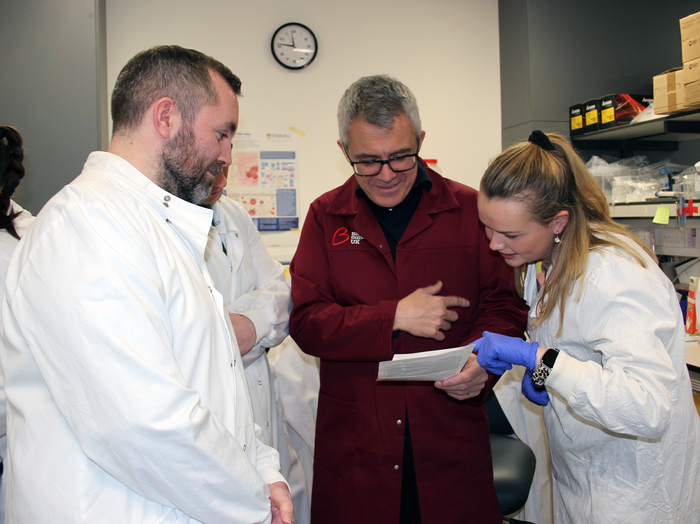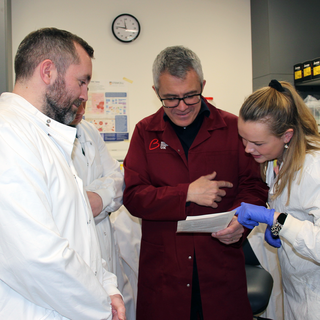Ambitious £4 million project to develop clinical platform for blood cancer prevention
United Kingdom
World Cancer Day sees Blood Cancer UK and The Leukemia & Lymphoma Society announce the start of a transformative five-year, £4 million research project in Cambridge. The work will establish a clinical platform to identify individuals at high risk of certain blood cancers and develop interventions to prevent people from progressing to these diseases.
Professor George Vassiliou from the Wellcome-MRC Cambridge Stem Cell Institute (CSCI), University of Cambridge will spearhead the project, which focuses on myeloid blood cancers, a group of blood cancers that accounts for more than 11,000 deaths each year in the UK.
The blood cancers, which affect both the bone marrow and blood, include acute myeloid leukaemia (AML), myelodysplastic syndromes (MDS), myeloproliferative neoplasms (MPN) and rarer cancers like chronic myelomonocytic leukaemia (CMML).
Prevention into solid cancers that form tumours is an advanced area of research and clinical practice, but we’re simply not at that stage with blood cancers yet.
- Dr Rubina Ahmed, Director of Research, Services and Mission at Blood Cancer UK
And while many of the myeloid blood cancers currently don’t have a cure, there's hope, as previous work from Professor Vassiliou’s team and their collaborators revealed that many people at high risk of developing these blood cancers can be identified years in advance. In this new project researchers will develop a screening system to identify, at scale, people at high risk of myeloid blood cancers and develop strategies to prevent these diseases from developing in the first place.
In parallel, planned laboratory experiments will identify the mechanisms involved in progression towards these blood cancers and ways to stall or reverse them. Crucially, the project will also build, at Addenbrookes, the clinical infrastructure to facilitate implementation and testing of clinical interventions in those at high risk.
The development of a national clinical network focused on preventing blood cancers like Ellie’s gives us hope for better outcomes for others.
- Emma Bray, Blood Cancer UK supporter and Ellie Bray's sister
Speaking about the funding, Blood Cancer UK's Director of Research, Dr Rubina Ahmed, said:
"Blood cancer is the UK’s third biggest cancer killer, so this programme to transform our understanding of myeloid blood cancers and help us develop effective prevention strategies is much needed. Prevention into solid cancers that form tumours is an advanced area of research and clinical practice, but we’re simply not at that stage with blood cancers yet. So we’re pleased to work together with another international funder and scientists in world leading research institutes, to beat blood cancer in a generation.”
The CSCI is where Professor George Vassiliou and seven of the nine lead investigators are based.
One of the crucial parts of this project is the establishment of a specialised clinical network, where patients at high risk of developing myeloid blood cancers, will undergo an in-person visit, followed by remote or virtual follow-up visits.
- Professor George Vassiliou
Professor Vassiliou, continued saying:
“The virtual element to the programme will be important for scaling up blood cancer prevention to a national level, in collaboration with leading NHS hospitals, something we expect to establish over the next few years.”

Ellie Bray from Cambridgeshire was 18 when she sadly passed away from a myeloid blood cancer, AML. First diagnosed in 2020, she underwent six months of tough chemotherapy, which successfully put her into remission in March 2021. During remission, Ellie was able to live the life or a normal teenager and fitted in many activities during those months, but sadly in July 2021 her cancer returned. More chemotherapy and a stem cell transplant followed, but a year after she was first diagnosed, doctors informed Ellie and her family that there was nothing more they could do to treat her blood cancer.
Throughout her sister’s AML diagnosis, Emma was by her side:
“We held on to the hope that she was going to be ok but the trial sadly didn't work for Ellie. She was a kind girl and so full of life and, while we received great support, losing Ellie from blood cancer is still all too painful. The development of a national clinical network focused on preventing blood cancers like Ellie’s gives us hope for better outcomes for others. It's a step towards a better future."
Dr Lee Greenberger, Chief Scientific Officer at The Leukemia & Lymphoma Society said:
“We want to improve outcomes and quality of life for patients affected by these challenging blood cancers. This funding collaboration between Blood Cancer UK and The Leukaemia and Lymphoma Society marks a significant stride towards advancing research, treatment, and prevention strategies for myeloid blood cancers on an international scale.”

